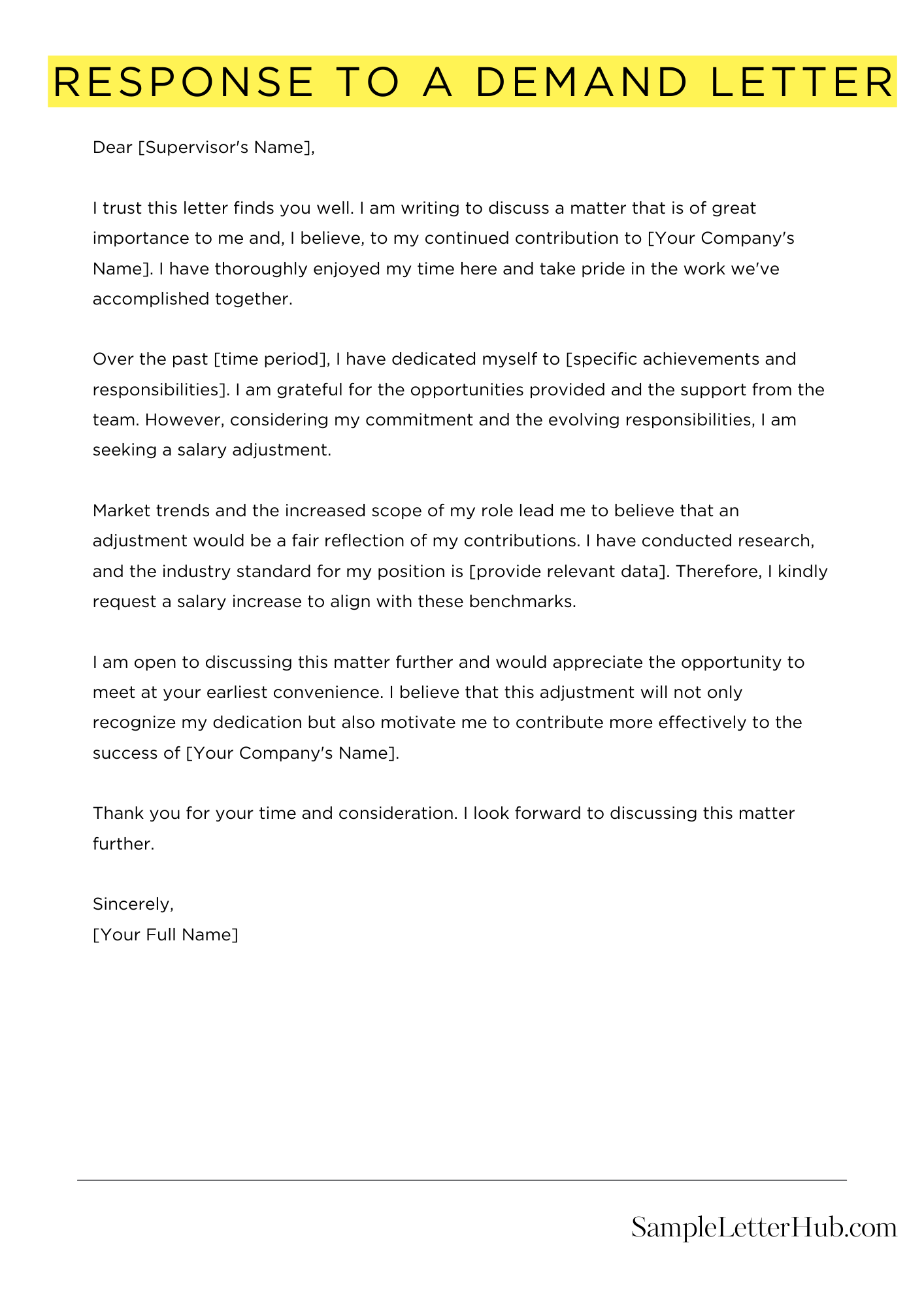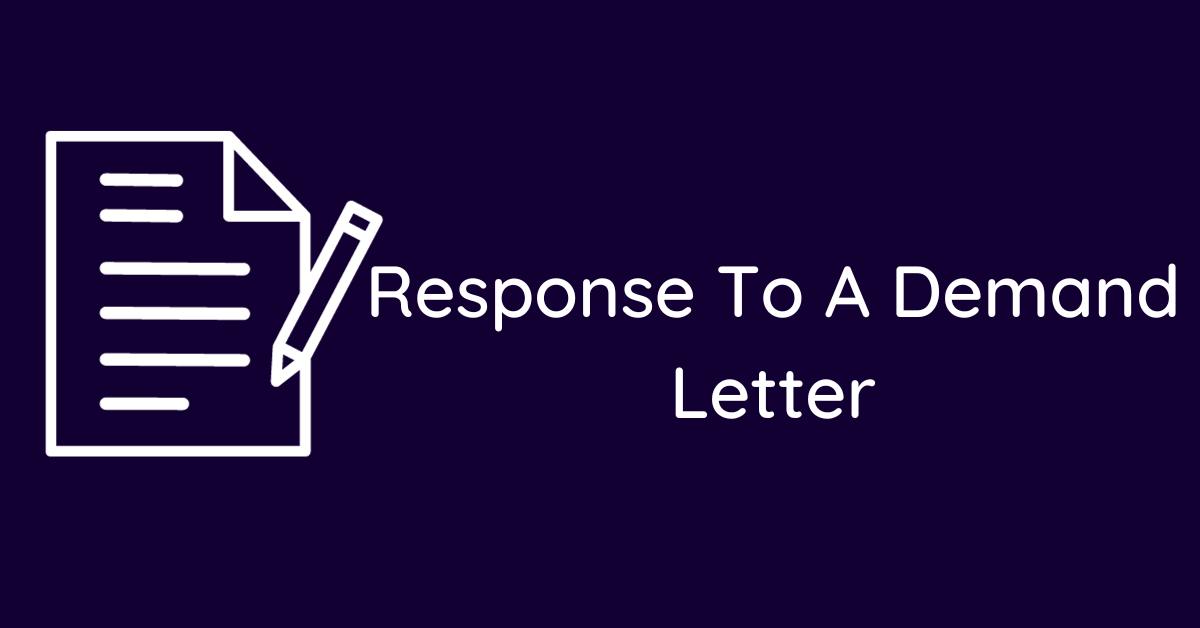If you have ever received a demand letter, you know how stressful it can be. A demand letter is a formal document that requests payment or action from someone who is believed to be in violation of a contract or agreement.
The purpose of a response to a demand letter is to address the issues raised in the letter and provide a clear and concise response to the demands made.
In this blog article, we will provide you with templates, examples, and samples of response to a demand letter. Our goal is to make it easy for you to write a response letter that is professional, effective, and meets your needs.
Whether you are responding to a demand for payment, a request for information, or a demand to cease and desist, we have the resources you need to craft a strong and effective response.
Our templates and examples are designed to help you save time and effort while ensuring that your response is clear, concise, and effective.
We understand that responding to a demand letter can be stressful, and we want to make the process as easy and straightforward as possible. So, let’s get started and take the first step towards crafting a strong and effective response to a demand letter.
Response To A Demand Letter
Dear [Sender’s Name],
I hope this letter finds you well. I have received your recent demand letter dated [Date]. I appreciate the clarity and transparency in outlining the concerns regarding [Subject of the Demand].
After careful review, I would like to assure you that your concerns have not gone unnoticed. I am currently exploring the matter internally to gather all relevant information and assess the situation comprehensively.
It is my intention to address this matter promptly and, if necessary, take corrective measures to rectify any issues that may have arisen. I value our relationship and am committed to finding a resolution that is fair and equitable for all parties involved.
I anticipate providing you with a detailed response by [Deadline for Response]. In the meantime, should you have any additional information or specific points you would like me to consider, please feel free to share them at your earliest convenience.
Thank you for your patience and understanding as we work towards a resolution. I look forward to the opportunity to amicably resolve this matter.
Sincerely,
Your Name
Sample Response To Demand Letter From Attorney
Dear [Attorney’s Name],
I trust this letter finds you well. I have received your demand letter dated [Date], and I appreciate the thoroughness with which you have outlined the concerns on behalf of your client.
Upon careful review of the matter, I want to assure you that I take these concerns seriously. I am currently in the process of gathering all relevant information to understand the intricacies of the situation and assess the validity of the claims presented.
It is my commitment to address this matter in a timely and responsible manner. I anticipate providing you with a comprehensive response by [Deadline for Response]. In the interim, should you require any additional information or wish to discuss specific aspects further, please do not hesitate to reach out.
Thank you for your professional communication on this matter. I am dedicated to resolving this issue amicably and in the best interest of all parties involved.
Sincerely,
Your Name
Response To Demand Letter For Payment
Dear [Sender’s Name],
I trust this letter finds you in good health. I have received your recent demand letter dated [Date], and I appreciate the attention you have brought to the matter of outstanding payment.
Allow me to express my sincere apologies for any inconvenience caused by the delay in settling the payment. I acknowledge the importance of this obligation and assure you that it is not my intention to disregard it.
I am currently reviewing my financial situation to address this matter promptly. I understand the significance of resolving this issue and am committed to settling the outstanding amount by [Agreed-upon Date].
Your patience and understanding during this time are greatly appreciated. I value our business relationship and am taking immediate steps to ensure a timely resolution.
Thank you for bringing this to my attention, and I look forward to the successful resolution of this matter.
Best regards,
Your Name
Responding To A Demand Letter
Dear [Sender’s Name],
I trust this letter finds you well. I am writing in response to the demand letter dated [Date] that I received regarding [Nature of the Demand].
Thank you for bringing this matter to my attention. I want to assure you that I take the concerns outlined in your letter seriously and am committed to addressing them promptly and responsibly.
I am currently reviewing the details of the demand and conducting a thorough assessment of the situation. My goal is to provide you with a comprehensive response by [Agreed-upon Date].
Your patience during this process is greatly appreciated. I understand the importance of resolving this matter and am dedicated to achieving a fair and equitable resolution.
If you have any additional information or specific points you would like me to consider in the meantime, please feel free to share them. I value open communication and transparency throughout this process.
Thank you for your understanding, and I look forward to resolving this matter amicably.
Best regards,
Your Name
Sample Response To Attorney Demand Letter
Dear [Attorney’s Name],
I trust this letter finds you well. I am writing in response to the demand letter dated [Date] that you sent regarding [Subject of the Demand].
Thank you for bringing this matter to my attention. I want to assure you that I take the concerns outlined in your letter seriously and am committed to addressing them responsibly.
I am currently reviewing the details of the demand and seeking legal counsel to ensure a thorough understanding of the situation. I aim to provide you with a comprehensive response by [Agreed-upon Date].
Your patience during this process is greatly appreciated. I understand the importance of resolving this matter, and I am dedicated to achieving a fair and equitable resolution.
If you have any additional information or specific points you would like me to consider in the meantime, please feel free to share them. I value open communication and transparency throughout this process.
Thank you for your understanding, and I look forward to resolving this matter amicably.
Best regards,
Your Name

How to Write a Response to a Demand Letter
If you have received a demand letter, it is important to respond in a timely and professional manner. A demand letter is a legal document that outlines a request for payment or action, and failing to respond can result in legal consequences. Here are seven steps to help you write a response to a demand letter.
1. Understand the Demand Letter
Before you begin writing your response, it is important to fully understand the demand letter. Read it carefully and make note of any deadlines or specific requests. Identify the key issues and determine what action is being demanded.
2. Gather Information
Once you understand the demand letter, gather any relevant information that will help you respond. This may include contracts, invoices, receipts, or other documentation. Review your records and make sure you have a clear understanding of the situation.
3. Determine Your Response
Based on the information you have gathered, determine your response. Decide whether you will comply with the demand, negotiate a settlement, or dispute the claim. Consider the potential consequences of each option and choose the best course of action.
4. Draft Your Response
When drafting your response, be clear and concise. Use professional language and avoid emotional or confrontational language. Address each issue raised in the demand letter and provide any relevant information or documentation to support your position.
5. Be Respectful
Even if you disagree with the demand, it is important to be respectful in your response. Avoid making personal attacks or using inflammatory language. Stick to the facts and present your case in a professional manner.
6. Proofread Your Response
Before sending your response, proofread it carefully. Check for spelling and grammar errors, and make sure your response is clear and easy to understand. Ask a colleague or friend to review your response and provide feedback.
7. Send Your Response
Once you are satisfied with your response, send it to the sender of the demand letter. Make sure to send it within any deadlines specified in the demand letter. Keep a copy of your response for your records.
FAQs About Response to a Demand Letter
1. What is a demand letter?
A demand letter is a legal document that outlines a request for payment or action. It is typically sent by one party to another in an attempt to resolve a dispute without going to court.
2. What should I do when I receive a demand letter?
When you receive a demand letter, it is important to read it carefully and understand the demands being made. You should also consult with an attorney to determine the best course of action.
3. Do I need to respond to a demand letter?
Yes, it is important to respond to a demand letter in a timely and appropriate manner. Failing to respond can result in legal consequences.
4. How should I respond to a demand letter?
Your response to a demand letter should be professional and concise. You should address the demands being made and provide any relevant information or documentation to support your position.
5. Can I negotiate with the sender of the demand letter?
Yes, it is possible to negotiate with the sender of a demand letter. However, it is important to do so in a professional and respectful manner.
6. What if I cannot comply with the demands in the demand letter?
If you cannot comply with the demands in the demand letter, you should explain why and provide any relevant information or documentation to support your position.
7. What are the consequences of not responding to a demand letter?
Failing to respond to a demand letter can result in legal consequences, including a lawsuit being filed against you. It is important to respond in a timely and appropriate manner to avoid these consequences.
- Goodbye Letter To Students ( 5 Samples )
- Letter Of Intent To Hire ( 5 Samples )
- Letters To The President ( 5 Samples )
- Letter To The Bride Book ( 5 Samples )
- Authorization Letter To Bank ( 5 Samples )

